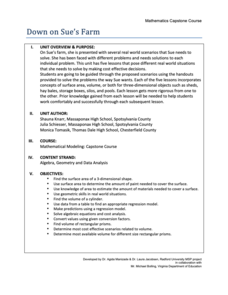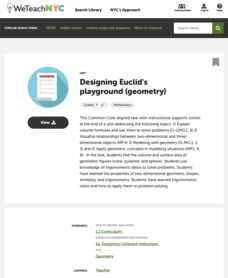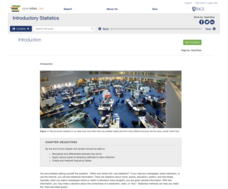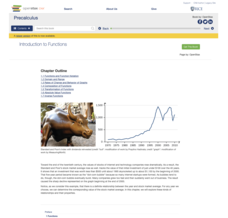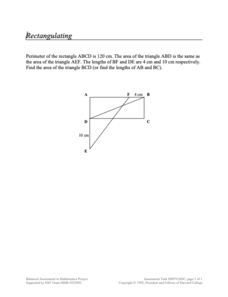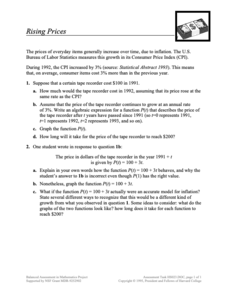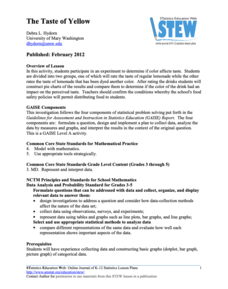Radford University
Earthquake Problem
Shake up things in the classroom. The unit uses earthquakes to bring a real-life connection to finding arc lengths, logarithms, and equations of circles. Small groups determine whether particular towns would have felt an earthquake after...
Radford University
Right Triangle Applications: Lesson 3
Find the connection between trigonometry and tornadoes. Pairs investigate a tornado in Joplin, Mo., and use trigonometry to find its size. The pupils determine the path of the tornado and find the distance needed to travel to help...
Radford University
Down on Sue's Farm
When would a farmer use math? Class members work through five tasks on a farm that require knowledge of surface area, volume, and determining regression equations. The challenges range from figuring out the amount of paint to buy,...
Radford University
Environmental Issues
Pupils investigate the air pollution situation in China by fitting a curve to historical data. They dig deeper into environmental issues that are of interest and provide a mathematical analysis of the issue. Class members develop a route...
Radford University
Subdivision Design and Quadrilaterals
They say real estate is location, it might be more about area. Learners work individually and in groups to design subdivisions by dividing the land up into lots. Scholars design floor plans to fit on the lots along with including a park....
Radford University
How to Build a Happy Home
Build a complete house in just a few days. Learners create floor, roof, deck, and landscape plans for a two-story house. Scholars then use their knowledge of area formulas, trigonometric ratios, and the Pythagorean Theorem to determine...
Radford University
The Wheels on the Bus
Find a cheaper way to keep buses going round and round. Small groups use their knowledge of ratios and proportions to find ways to save money on school transportation. The teams determine the number of miles buses currently travel by...
Radford University
Natural Disaster Recovery and Quadrilaterals: Trapezoids and Land Assessments
After a tornado, an insurance company is in need of finding the area of a plot of land. Pupils use their knowledge of trapezoids and area formulas to calculate the area of the plot of land. The scholars work in groups to justify the...
Radford University
Ping Pong Packing
Bounce off some ideas to reduce the amount of wasted space. Teams work together to determine the best size and shape of container to package a large order of ping pong balls. Groups are to design the container to reduce the amount of...
Radford University
2 and 3 Dimensional Shapes
Take a similar approach to three dimensions. Pupils develop the relationship between areas of similar objects and see how they relate to the ratio of the sides. Building upon area formulas, small groups put together volume formulas for...
Radford University
Next Top Model
Create a world of similar models. The geometry and measurement unit uses real-world scenarios to create models of familiar buildings and rooms. Scholars work with blueprints and scale models to compare areas and volumes between the...
Purdue University
The Represented World: Recreational STEM
How are forces and motion important to a swing set? Scholars explore the concepts of force and motion using swing sets. In preparation for their own STEM design project, individuals take surveys and data from peers, complete labs on...
Achieve
Medication Dosage
Here's the cure to boredom. Given a patient file, including medication dosage information, scholars determine the amount of medication left in the patient's bloodstream over time. They analyze the sequence of numbers and determine a...
New York City Department of Education
Designing Euclid’s Playground
Create a geometric playground. Pupils work through a performance task to demonstrate their ability to use geometric concepts to solve everyday problems. The accompanying engineering design lessons show teachers how the assessment works...
National Nanotechnology Infrastructure Network
Learning About Surface Area and Volume
Plan a dinner party. Using a book by Marilyn Burns as a context, pupils learn about the relationships between area and perimeter and surface area and volume. The hands-on activities have learners rearrange tables and cut up meatballs to...
New York City Department of Education
Chris’ Garden Dilemma
Make the connections between area, tiling, and multiplication. A performance task and associated unit presents the concept of area and makes the connection to multiplication. Pupils work through three major sections of instruction that...
New York City Department of Education
Isabella’s Garden
Create rows and rows of vegetables. Pupils use their knowledge of multiplication to find the number of vegetable shoots planted in a garden and ways to arrange the vegetables in the performance task. Teachers use the suggested unit...
New York City Department of Education
Dance and Text
Use texts and dances to teach inequalities and equations. A sixth-grade unit covers using variables in equations and inequalities to solve problems. Learners show what they know at the end of the unit using two performance tasks, one...
Rice University
Introductory Statistics
Statistically speaking, the content covers several grades. Featuring all of the statistics typically covered in a college-level Statistics course, the expansive content spans from sixth grade on up to high school. Material comes from a...
Rice University
Precalculus
Take a step beyond Algebra 2. Learners use the eBook to learn concepts from the typical Precalculus course. Content starts off with a short review of functions in general and moves on to the basic functions, finishing up with more...
Agriculture in the Classroom
Roll of the Genes
Animal reproduction in sheep and cattle is explored with the help of Punnet squares. Scholars employ tools using probability to conclude the color of wool a sheep's offspring will have. Acting as animal geneticists, pupils then take...
Concord Consortium
Rectangulating
Use rectangles to find distances. Given a rectangle and three associated triangles, pupils determine the area of the triangles. Scholars know the three triangles have equal areas along with the perimeter of the rectangle and two other...
Concord Consortium
Rising Prices
What will that cost in the future? The scenario provides pupils with a growth as a Consumer Price Index. Learners create functions for a given item to determine future prices and graph them. Class members then compare their functions to...
American Statistical Association
The Taste of Yellow
Does lemonade taste better when yellow? A tasty experiment has scholars determine the answer to the question. It requires conducting a taste test with lemonades of different colors (from food coloring), and then collecting and analyzing...




